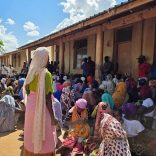UNHCR: Violence flares anew in northern Mozambique, forcing 22,000 to flee in a week
Malaria cases increase, but Malaria deaths fall in Mozambique

In the first three months of this year, Mozambique recorded slightly more than two million cases of malaria, Health Minister Nazira Abdula announced on Tuesday.
Speaking at a ceremony in Maputo to commemorate World Malaria Day, Abdula said this was a 22 per cent increase on the figure for the same period in 2016, when there were 1,873,303 cases of malaria diagnosed.
The Minister added that the main increases had occurred in the central provinces of Manica and Tete and the southern provinces of Inhambane and Gaza.
“Malaria remains one of the greatest public health problems in our country”, said Abdula. “It is most frequent in the period from December to April when, every year, we witness, in a frightening way, the health units full of patients suffering from malaria, particularly children”.
But despite the increase in the number of cases, there have been fewer deaths from malaria in Mozambican health units. The number of registered malaria deaths in the first quarter of this year was 424 – a 16 per cent decline on the 2016 figure of 504 deaths. The number of cases of serious malaria requiring hospitalization fell by 10 per cent – from 22,981 in 2016 to 20,881 this year.
In its attempts to free the country of malaria, said Abdula, the Health Ministry is strengthening its interventions both to prevent and cure the disease. Thus 56 per cent of pregnant women had received intermittent preventive treatment, which is a full therapeutic course of antimalarial medicine given to pregnant women at routine antenatal care visits, regardless of whether the recipient is infected with malaria.
82 per cent of pregnant women received mosquito nets during antenatal visits, and in the most populous province, Nampula, 94 per cent of the population benefitted from distribution of nets that covered all the districts.
The Health Ministry is now in the midst of a campaign to distribute 16 million nets to cover all households in the country.
Abdula admitted there can be problems in ensuring that the nets are used properly (and there have been repeated reports of mosquito nets being used in fishing – which not only renders the nets useless for their primary purpose, but has damaging effects on the marine environment).
The Minster thought such problems could be overcome with greater attempts to raise the awareness of households and explain “the advantages of using mosquito nets to prevent malaria”.
As for treating the disease, Abdula said Mozambique has been implementing effective polices using artemisinin-based combination therapy (ACT). This form of treatment has shown high effectiveness, is fast acting and with a reduced likelihood of developing drug resistance.
“We have managed to allocate these drugs down to village level, through the community health workers who can diagnose and treat cases of simple malaria, thus reducing mortality”, added the Minister.
Among the challenges still to be faced, Abdula said, was overcoming resistance among the population (particularly in urban areas) to having their houses sprayed against mosquitoes, and even to sleeping under mosquito nets. She added that it was also crucial to eliminate pools of stagnant water where mosquitoes can breed.












Leave a Reply
Be the First to Comment!
You must be logged in to post a comment.
You must be logged in to post a comment.